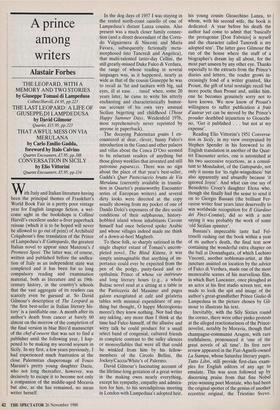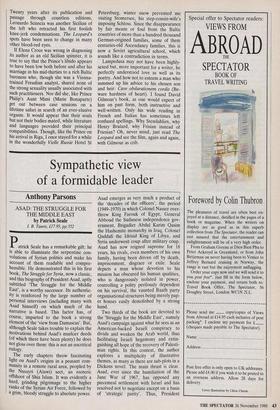A prince
among writers
Alastair Forbes
THE LEOPARD, WITH A MEMORY AND TWO STORIES by Giuseppe Tomasi di Lampedusa
Collins/Harvill, £4.95, pp.223
THE LAST LEOPARD: A LIFE OF GIUSEPPE(DI LAMPDEDUSA by David Gilmour
Quartet, £15.95, pp.223
THAT AWFUL MESS ON VIA MERULANA by Carlo Emilio Gadda, foreword by Italo Calvino
Quartet Encounters, £7.95, pp.388
CONVERSATION IN SICILY by Elio Vittorini
Quartet Encounters, £5.95, pp.134
With Italy and Italian literature having been the principal themes of Frankfurt's World Book Fair in a pretty poor vintage year for English language fiction, a wel- come sight in the bookshops is Collins/ Harvill's excellent under-a-fiver paperback reissue (which it is to be hoped will never be allowed to go out of print) of Archibald Colquhoun's fine translation of the Prince of Lampedusa's 11 Gattopardo, the greatest Italian novel to appear since Manzoni's I Promessi Sposi. The latter was, of course, written and published before the unifica- tion of Italy as an independent state was completed and it has been for so long compulsory reading and examination material, both as literature and as 19th- century history, in the country's schools that the vast aggregate of its readers can scarcely even be guessed at. So David Gilmour's description of The Leopard as `the first best-seller in Italian literary his- tory' is a justifiable one.• A month after its author's death from cancer at barely 60 almost on the morrow of the completion of the final version in blue Biro'd manuscript of the chef-d'oeuvre that was not to find a publisher until the following year, I hap- pened to be making my second sojourn in Sicily. In my first, a few years previously, I had experienced much frustration at the close Palermitan chaperonage of Fosco Maraini's pretty young daughter Dacia, who not long thereafter, however, was decisively to escape it to become not only a companion of the middle-aged Moravia but also, as she has remained, no mean writer herself. In the dog days of 1957 1 was staying in the rented north-coast castello of one of Lampedusa's distant Lanza cousins. Also present was a much closer family connec- tion (and a direct descendant of the Corra- do Valguarnera di Niscemi and Maria Favara, subsequently fictionally meta- morphosed into Tancredi and Angelica), that multi-talented latter-day Cellini, the still greatly-missed Duke Fulco di Verdura, the range of whose reading in several languages was, as it happened, nearly as wide as that of the cousin Giuseppe he was to recall as 'fat and taciturn with big, sad eyes, ill at ease. . timid' when, some 20 years later, he came to write his utterly enchanting and characteristically humor- ous account of his own very unusual Sicilian begetting and childhood (Those Happy Summer Days, Weidenfeld 1976, most reprehensively never reprinted by anyone in paperback).
The decaying Palermitan gratin I en- countered at dear, clever, funny Fulco's introduction in the Ganci and other palaces and villas about the Conca D'Oro seemed to be reluctant readers of anything but those glossy weeklies that invented and still patronise paparazzi. There was no sign about the place of that year's best-seller, Gadda's Quer Pasticciaccio brutto de Via Merulana (currently available in transla- tion in Quartet's praiseworthy Encounter series of European writers) and several dirty looks were directed at the copy usually showing from my pocket of one of Danilo Dolci's exposures of the dire social conditions of their sulphurous, history- hobbled island whose inhabitants Cavour himself had once believed spoke Arabic and whose villages indeed made me think of a down-at-heel Maghreb.
To these folk, so sharply satirised in the single chapter extant of Tomasi's uncom- pleted novel, The Blind Kittens, it was simply unimaginable that anything of im- portance could ever be expected from the pen of the podgy, pasty-faced and ex- opthalmic Prince of whose vie interieure and long literary hours (e.g., a whole Balzac novel read at a sitting at a table in the Pasticceria del Massimo and pages galore excogitated at cafe and gelateria tables with minimal expenditure of any- thing but thought, 0 happy Mezzogiorno mores!) they knew nothing. Nor had they any inkling, any more than I think at the time had Fulco himself, of the allusive and witty talk he could produce for a small select band of congenial, cultured friends in complete contrast to the sulky silences or monosyllables that were all that could be winkled from him by his fellow- members of the Circolo Bellini, the Jockey/Caccia/White's of Palermo.
David Gilmour's fascinating account of the lifetime-long gestation of a great writer in the making owes nearly everything, except his sympathy, empathy and admira- tion for him, to his serendipitous meeting in London with Lampedusa's adopted heir, his young cousin Gioacchino Lanza, to whom, with his second wife, the book is dedicated. A year before his death the author had come to admit that `basically the protagonist [Don Fabrizio] is myself and the character called Tancredi is my adopted son'. The latter gave Gilmour the run of the house where the stuff of a biographer's dream lay all about, for the most part unseen by any other eye. Thanks especially to the extracts from the Prince's diaries and letters, the reader grows in- creasingly fond of a writer granted, like Proust, the gift of total nostalgic recall but more poetic than Proust and, unlike him, one he becomes genuinely sorry not to have known. We now know of Proust's willingness to suffer publication a frais d'auteur yet can be moved by the Prince's prouder deathbed injunction to Gioacchi- no, `Get it published . . . but not at my expense'.
Reading Elio Vittorini's 1951 Conversa- tion in Sicily, in my view overpraised by Stephen Spender in his foreword to its English translation in another of the Quar- tet Encounter series, one is astonished at his two successive rejections, as a consul- tant to Mondadori, of the Gattopardo, not only it seems for 'its right-wingedness' but also apparently and absurdly because 'it ignored Joyce'. And what can one say of Benedetto Croce's daughter Elena who, though she finally had the sense to send it on to Giorgio Bassani (the brilliant Fer- rarese writer four years later deservedly to win worldwide recognition for Il Giardino del Finzi-Contini), did so with a note saying it was probably the work of some `old Sicilian spinster'.
Bassani's impeccable taste had Fel- trinelli rushing out the book within a year of its author's death, the final text now containing the wonderful extra chapter on the ball at Donnafugata, of which Luchino Visconti, another nobleman-artist, at this juncture assisted on location by the advice of Fulco di Verdura, made one of the most memorable scenes of his marvellous film, in which Burt Lancaster, once ploughed as an actor at his first studio screen test, was made to look the spit and image of the author's great-grandfather Prince Giulio di Lampedusa in the picture chosen by Gil- mour to illustrate his text.
Inevitably, with the Silly Sixties round the corner, there were other pinko protests at the alleged reactionariness of the Prince- novelist, notably by Moravia, though that champagne-communist Aragon, with rare truthfulness, pronounced it 'one of the great novels of all time'. Its first rave review appeared in the Fiat-Agnelli-owned La Star-film, whose Saturday literary pages, Tutto Libri, still provide first-class exam- ples for English editors of any age to emulate. This was soon followed up by discerning praise from that fine Nobel prize-winning poet Montale, who had been the original spotter of the genius of another eccentric original, the Triestino Svevo. Twenty years after its publication and passage through countless editions, Leonardo Sciascia was another Sicilian of the left who retracted his first foolish knee-jerk condemnations. The Leopard's spots have been seen to change in many other blood-red eyes.
If Elena Croce was wrong in diagnosing its author as an old Sicilian spinster, it is true to say that the Prince's libido appears to have been low both before and after his marriage in his mid-thirties to a rich Baltic baroness who, though she was a Vienna- trained Freudian analyst, shared none of the strong sexuality usually associated with such practitioners. Nor did she, like Prince Philip's Aunt Mimi (Marie Bonaparte) get out between case sessions on a lifetime safari in search of an ever-elusive orgasm. It would appear that their souls but not their bodies mated, while literature and languages provided their principal compatibilities. Though, like the Prince on his arrival in Riga, I once stayed for a while in the wonderfully Vielle Russie Hotel St Petersburg, winter snow prevented me visiting Stomersee, his step-cousin-wife's imposing Schloss. Since the disappearance by fair means or foul from the Baltic countries of more than a hundred thousand German-origined families, some of them centuries-old Ascendancy families, this is now a Soviet agricultural school, which sounds like a contradiction in terms.
Lampedusa may not have been highly- sexed but, more important for a writer, he perfectly understood love as well as its poetry. And how not to esteem a man who summed up his advice to his chosen son and heir: Cave obdurationem cordis (Be- ware hardness of heart). I found David Gilmour's book, as one would expect of him on past form, both instructive and well-written. Only his wide reading in French and Italian has sometimes left confused spellings. Why Stendahlien, why Henry Brulard, why Frisian instead of Friesian? Oh, never mind, just read The Leopard and see the film, again and again, with Gilmour as crib.











































































 Previous page
Previous page